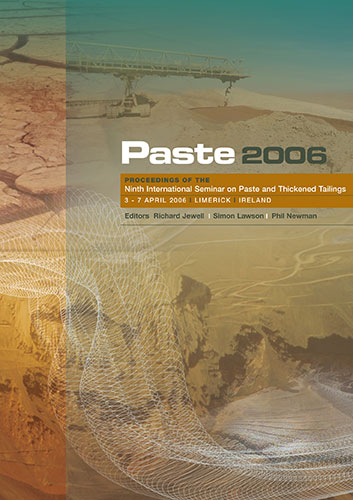The Slide – A Simple Way to Design Paste Lines

|
Authors: Hallbom, DJ; Chapman, JP Paper is not available for download Contact Us |
DOI https://doi.org/10.36487/ACG_repo/663_33
Cite As:
Hallbom, DJ & Chapman, JP 2006, 'The Slide – A Simple Way to Design Paste Lines', in R Jewell, S Lawson & P Newman (eds), Paste 2006: Proceedings of the Ninth International Seminar on Paste and Thickened Tailings, Australian Centre for Geomechanics, Perth, pp. 383-393, https://doi.org/10.36487/ACG_repo/663_33
Abstract:
Routing a paste distribution pipeline can be a rather complicated three-dimensional puzzle. To reduce initial capital cost, the designer tries to use existing shafts, access ways, and boreholes. However, a poor pipeline layout can cause chronic operating problems and increase the total cost of the system. This may be due to high binder usage or power costs. It could be due to high wear rates that shorten the life of the pipelines or boreholes. It could be due to the line plugging or blowing the pressure relief on a regular basis. It could be a low paste transfer rate that limits how fast the stopes can be filled (and therefore mined). A low initial capital cost solution can quickly become a high capital cost solution if boreholes need to be replaced on a regular basis because they are plugged with paste or the casings have worn through. A well laid out pipeline will be easy to operate and have the lowest total cost. That begs the question: �What does a well laid out pipeline look like?� To answer this, one needs to consider a few key concepts: costs, binder usage, paste flow behaviour, and wear.
References:
Hallbom, D.J. (2005) The “lump” test, Proceedings of the Eighth International Seminar on Paste and Thickened Tailings, Santiago,
Chile, pp. 73-98.
Hallbom, D.J. and Klein, B. (2004) Flow array for nickel laterite slurry, International Laterite Nickel Symposium, Charlotte NC, pp.
415-428.
Wasp, E.J., Kenny, J.P. and Gandhi, R.L. (1977) Solid-Liquid Flow Slurry Pipeline Transportation, Trans Tech Pub, Series on Bulk
Material Handling Vol.1 (1975/77) No.4.
Paste2006,Limerick,Ireland 393
trAnsPort issues
© Copyright 2026, Australian Centre for Geomechanics (ACG), The University of Western Australia. All rights reserved.
View copyright/legal information
Please direct any queries or error reports to repository-acg@uwa.edu.au
View copyright/legal information
Please direct any queries or error reports to repository-acg@uwa.edu.au